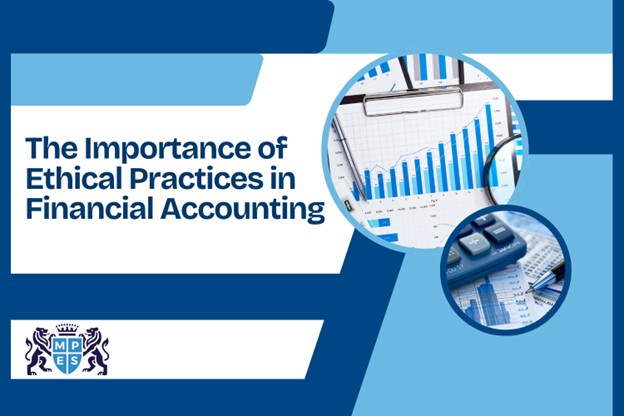The Importance of Ethical Practices in Financial Accounting
Have you ever wondered why ethics are so crucial in accounting? In ACCA Foundations, understanding the significance of ethical accounting is essential. Ethics in ACCA Foundations highlights the need for integrity in every financial task. It also emphasises the role of ethical standards in building trust within Financial Accounting. Ethics in accounting or Ethical Accounting […]

the importance of ethical practices in financial accounting
Have you ever wondered why ethics are so crucial in accounting? In ACCA Foundations, understanding the significance of ethical accounting is essential. Ethics in ACCA Foundations highlights the need for integrity in every financial task. It also emphasises the role of ethical standards in building trust within Financial Accounting. Ethics in accounting or Ethical Accounting ensures transparency and trust in every transaction. Let’s dive deeper into why ethics matter in financial accounting, how they influence every financial decision, and their impact on businesses and professionals.
Table of Contents
- The Pillars of Ethical Accounting
- Why Ethics Matter in Financial Accounting
- Conclusion
The Pillars of Ethical Accounting
These basic ideas highlight important ethical guidelines that direct accountants in moral decision-making:
Integrity
In all professional and commercial contacts, be direct and honest. Integrity guarantees accuracy and truthfulness in financial statements, therefore building dependability. It promotes openness and lets accountants answer for their work.
Objectivity
Not letting professional opinions be undermined by prejudice, conflicts of interest, or too strong an influence. Accountants have to be objective in order to provide correct financial data. This advances honest financial reporting and objective documentation.
Professional Competence and Due Care
keeping professional knowledge and ability at the necessary level to guarantee customers get competent professional services. This idea underlines superior service and lifelong learning. It guarantees also that accountants keep current with industry norms.
Confidentiality
Respecting the confidentiality of information acquired during professional services and not disclosing it without proper authority. It guarantees that only when absolutely required sensitive data is disclosed and secured. This idea helps customers to develop confidence and prevents data leaks.
Professional Behaviour
Following pertinent laws and rules and staying away from behaviour that calls for the disgrace of the profession. To maintain the integrity of their field, accountants have to behave sensibly. It also promotes adherence to ethical codes and industry standards.
Why Ethics Matter in Financial Accounting
Ethical practices in financial accounting are essential for several reasons:
Building Trust with Stakeholders
Correct financial reporting builds public, creditor, and investor trust. By proving openness and responsibility, it generates investment and fosters long-term corporate ties. Ethical reporting guarantees stakeholders that financial information is free from manipulation. Sustainability and financial health are promoted in trustworthy accounting. It also enables businesses to maintain good relationships with stakeholders and get finance.
Preventing Fraud and Misconduct
Ethics help deter fraudulent practices such as embezzlement and misrepresentation. A culture of integrity guarantees workers stay alert and that financial anomalies are taken care of quickly. Ethical systems offer clear rules that deter criminal behaviour. They support studies and internal audits. This builds the company’s reputation and helps to lower financial losses.
Ensuring Compliance with Regulations
Ethical guidelines guarantee businesses obey financial rules, thus avoiding legal fines and preserving good standing with regulatory agencies and so improving their reputation and operational performance. Compliance lets businesses stay free from fines and penalties. Furthermore, it is guaranteed by ethical behaviour that correct tax filings are made. They improve regulatory confidence and financial reporting fairness.
Promoting Financial Stability
Accurate financial records produced by ethical accounting are crucial for good financial decisions, effective resource management, and prevention of financial disasters. Reliable records let businesses track financial flows. Ethical standards ensure financial planning aligns with actual data. This stability helps investments, corporate expansion, and development.
Improving business reputation
Ethical businesses attract partners, customers, and investors. Long-term sustainability and a competitive advantage come from a solid reputation based on ethics. Ethical reputation enhances market value. They strengthen corporate relationships and customer loyalty. Usually preferred in competitive bids are ethical businesses.
Enhancing Decision-Making
Ethics ensure decisions are based on accurate, trustworthy financial facts, facilitating improved strategic planning and resource allocation. Standard ethical guidelines help to lower financial analysis mistakes. They provide a clear financial picture for management. This backs up wise decisions and future expansion plans.
Promoting Transparency
By encouraging transparency in financial transactions, ethical accounting helps stakeholders to properly grasp the operations and financial situation of a business. Transparent practices help in building long-term trust, facilitate better financial analysis, ensure accurate reporting, and encourage responsible business practices.
Advocating Corporate Governance
Strong ethical standards guarantee that systems of corporate governance run efficiently, therefore preserving checks and balances within the company. This guarantees that management operates for the best benefit of stakeholders, increases responsibility, enhances control, and boosts risk management.
Enhancing Employee Morale
A culture of ethics fosters a positive workplace environment where employees feel valued and motivated to maintain high standards. It improves retention, justice, employee happiness, equality, and a feeling of belonging by means of which productivity is raised.
Conclusion
Ethical practices are the cornerstone of trust and integrity in Financial Accounting. For those pursuing ACCA Foundations, a deep understanding and commitment to these ethical principles are essential. MPES Learning offers comprehensive resources and guidance to help aspiring accountants navigate the complexities of ethical standards, ensuring they are prepared to uphold the profession’s esteemed values.
